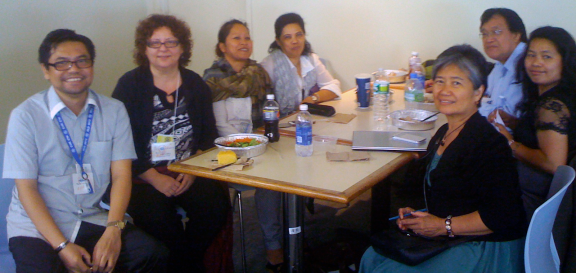Retired MoveUP member Cenen Bagon attended the People’s Global Action on Migration, Development and Human Rights and the UN High-Level Dialogue on Migration, Development and Human Rights with support from the union. She presented the following report to the MoveUP council on October 7, 2013.
I’m very fortunate to have experienced the People’s Global Action on Migration, Development and Human Rights (PGA) and the UN High-Level Dialogue on Migration, Development and Human Rights (HLD), and which also allowed me to meet so many activists from different countries and continents. I am especially pleased to have met and got to know the CLC delegation, led by Karl Flecker, National Director of the Anti-Racism and Human Rights Department of the Canadian Labour Congress.
Thanks are given to Karl, and for my part, to MoveUP and BCGEU for making this delegation together possible. I just got back yesterday, so this report is short and conveys what impressed me. I’ll write a longer report that will identify what workshops and plenaries I attended.
My experiences in the PGA far exceed my expectations.
My understanding of global migration and its strategies has widened, from the factors that push and pull domestic workers’ and farm workers’ migration and its organizing strategies, to cross border challenges and criminalization of migrants, to human trafficking and legal strategies, and to migration due to war, famine and environmental catastrophe and its intersections to the anti-war struggle and environmental work.
For domestic workers’ struggle, since the 1970s we’ve used the slogan “If we’re good enough to work, we’re good enough to stay. Landed status, now.”
I learned two new ones in PGA: “Make migration a choice, not a necessity” and “Migrants rights are human rights”.
The activists who attended the PGA came from different countries and continents—Africa, Asia-Pacific, Canada-US, Central America and Mexico, Europe, South America and West Asia—and the caucuses and working groups reflected this diversity. I’m so privileged to have learned from and have been empowered by the amount of networking and solidarity work in PGA. Aside from the workshops and plenaries I attended, I sat in one of the side meetings of Migrant Forum in Asia; I participated in the Women and Migration Caucus; and I participated in the formation of the Domestic Workers Working Group.
The Wall Street tour hosted by the activists from Occupy Wall Street confirmed for me not to use “modern day slavery” to describe the exploitations (even as its most severe) being experienced by foreign domestic workers and live-in caregivers. The history of slavery as it was explained to us by the Occupy activists and the 15,000 slaves buried in the streets of Wall Street cuts too deep to African-Americans history. I don’t think I can misappropriate the term “slavery”—no matter how the UN defines the term.
Though the UN HLD cannot be relied on to fully support the Civil Society’s eight point, five year action plan, I think the PGA should continue to convene the Civil Society such as to work on strategies and action plans like this one for HLD because this is our democratic right to exercise—to lobby and intervene in the decision-making processes so international policies will truly reflect, in this case, people’s development, migration and human rights. Our strategies and action plans, I’m sure, will improve as move forward.
I’m so glad to have met the members of the CLC delegation, but it was such a short period of time. I hope we’ll one day work on a campaign—maybe on ILO ratifications and other UN conventions to which Canada is not a signatory?
To the MoveUP executive board, executive councillors, and general membership: thank you so much for this opportunity and experience.



